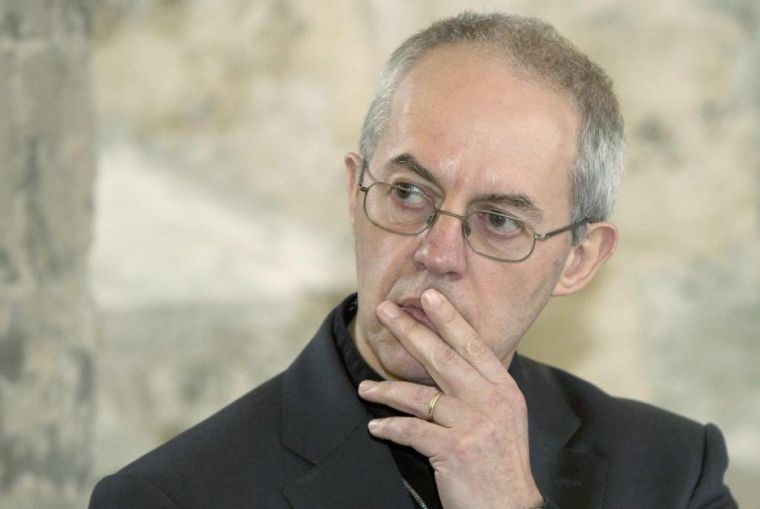Prime Minister backs C of E's battle-plan to tackle 'barbaric crime' of modern slavery
The Prime Minister is today backing the launch of a project aimed at mobilising the Church of England's 12,000 parishes in the battle to eradicate modern slavery.
Along with the Archbishop of Canterbury, Theresa May welcomed the official launch of the Clewer Initiative, a three-year programme to help the Church of England's 42 dioceses work to support victims of modern slavery and identify the signs of exploitation in their local communities.
The project will be launched later today at an event in Lambeth Palace attended by representatives from dioceses and other denominations, along with MPs and charities involved in work to combat modern slavery.
May, who has made tackling modern slavery a key part of her government's agenda, said: 'Modern slavery is a barbaric crime which destroys the lives of some of the most vulnerable in our society. I value the work that the Clewer Initiative will be doing to enable the Church of England dioceses and wider church networks to develop strategies to tackle modem slavery.
'In particular, I welcome the focus on engaging with local communities to help them to spot the signs of modem slavery. We need to shine a light on this hidden crime and to encourage more victims to come forward so that we can provide them with the support they need...[The] Government cannot tackle this problem alone and this is why the efforts of organisations and groups such as the Clewer Initiative are so important.'
More than 200 years after Britain abolished slavery, there are still an estimated 45.8 million men, women and children trapped in modern slavery, with up to 11,700 potential victims in the UK alone.
The launch comes a year after May announced a £33 million boost for the fight against human trafficking and modern slavery, which itself followed the introduction of the Modern Slavery Act in 2015.
And it comes, too, in the context of a recent report from the National Crime Agency (NCA) which said that modern slavery is now 'prevalent' across the UK, affecting 'every large town and city in the country'. Figures show that in 2016 the number of cases hit 3,805, with 'modern slaves' coming from 108 different countries, including the UK.
The Church pointed out that work is already under way in dioceses, with training and information sessions on how to provide support and identify victims of labour exploitation in areas from the construction and property sector to hand car washes in British cities and shipping.
Bath and Wells, Chester, Derby, Durham, Guildford, Lichfield, Liverpool, Portsmouth, Rochester, Southwell and Nottingham dioceses are already taking part with a further 14 dioceses due to sign up later this year.
The diocese of Derby has become a key member of the Derby and Derbyshire Modern Slavery Partnership, uniting with police and social services working to help victims.
Speaking in a video message, the Archbishop of Canterbury, Justin Welby, encouraged churches to act as 'eyes and ears' in local communities to identify victims.

'Jesus came saying that he proclaimed freedom for captives,' he said. 'Freedom is something that we take for granted, but it is the gift of God, it is the purpose of God. Those who purposefully constrain, confine and traffic and enslave people will face the judgement of God for their terrible sins.
'Yet even more serious is when we choose not to see: when as it were we put on our own blindfolds and don't see those around us who are held in slavery, oppressed, trafficked, in other peoples' power.
'But we can change it - we can change it so easily, so quickly. We can set people free, set our society and nation free from the scourge of slavery simply by removing our blindfolds and acting on what we see."
The Independent Anti-Slavery Commissioner, Kevin Hyland said: 'Faith groups have influence, insight and rare avenues into the community; they are therefore a powerful tool in the fight against modern slavery.

'The Church of England has acted on this unique ability by launching The Clewer Initiative, which adds backbone to the church's anti-slavery approach. Clewer offers important knowledge to leaders of the Church, parish members and the public. By informing those who are in a position to identify and support victims of this brutal crime, I am confident that the Church is living up to its potential in defending the oppressed and overcoming injustice.'
The Bishop of Derby, Dr Alastair Redfern, who chairs the Independent Anti-Slavery Commissioner's Advisory Panel, added: 'Modern slavery is present in nearly every community in England and will continue to flourish if we remain indifferent to it. Churches can provide a space to gather of goodness and grace, with an open agenda where different groups can meet to discuss how they work together to support victims, and to improve efforts for rescue and prevention.'
The Clewer Initiative is named after the Clewer House of Mercy, a purpose-built Victorian convent and shelter in Windsor. The Sisters now reside at their new convent in Rippon College, Cuddesdon, and consider The Clewer Initiative part of the legacy of their Order.
More information on the Clewer Initiative can be found here: https://www.theclewerinitiative.org/











